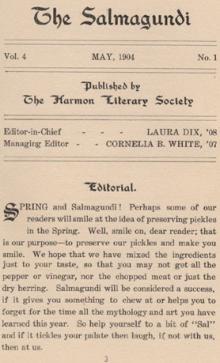- Home
- Archival Material
- College History Projects
- Subject-Based Digital Projects
The Salmagundi

The Salmagundi was the literary magazine published by the Harman Literary Society following its resurrection in 1900 at Dickinson College in Carlisle, Pennsylvania. The original Salmagundi was composed by Washington Irving in 1807 “simply to instruct the young, and reform the old, correct the town and castigate the age.” This objective the Harman Literary Society adopted as its own with the establishment of their magazine.
The name Salmagundi was derived from two Latin roots – salgama meaning “pickles” and condita meaning “preserved,” thus making the literal translation of the magazine “pickles preserved.” However, the Webster’s dictionary provided another definition for Salmagundi as “a mixture of chopped meat and pickled herring, with oil, vinegar, pepper and onions.” While the Harman Literary Society’s Salmagundi had nothing to do with food, the members used both definitions to describe in its pages the contents of their magazine as “…the chopped meat represented the real food for thought, in the magazine…They [the pickled herring] are not particularly nourishing, yet who would do without them?…not enough vinegar to make Sal really sour, nor yet sufficient pepper to make her truly dark and bitter, but just that happy combination of the two, that only the real chef can strike…she is well seasoned with the oil of good will.”
The first issue of The Salmagundi was published in 1904 under the leadership of Miss Ruth White. Miss White required every member of the society to submit something towards the publication of the magazine. The society’s members were so happy with the results of their labor that it was decided that the magazine should become an annual project for the group. The second edition was compiled under the direction of Miss Mabel Kirk who imposed the same instructions on the society as had Miss White. Though the women had decided to preserve copies of Salmagundi as an example for future society members, these copies were destroyed in the Denny Hall fire of March 1904. Nevertheless, the women were undaunted, and continued to compile annual editions of their magazine until 1908.
Date of Post:
2005